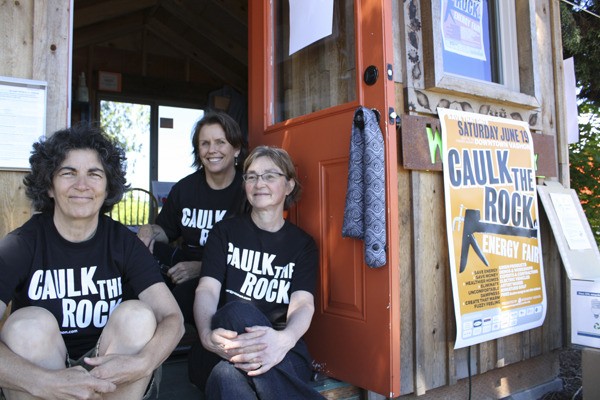Despite Vashon’s green credentials, the Island is not considered particularly strong when it comes to energy conservation. Chalk it up, at least in part, to the Island’s aging housing stock — a collection of homes built as summer get-aways, with thin walls and large, single-pane windows.
Now, a group of Islanders hopes to create a new reality on Vashon — one where the Island’s progressive politics begins to match its collective energy bill.
Caulk the Rock, a community-wide energy fair, will be held from 10 a.m. to 3 p.m. on Saturday, June 19 — an extravaganza that will mix the serious (just how do you effectively caulk a window?) with the fun (mini golf, for instance, with an energy conservation theme).
Art made from recycled materials will be on hand. Vendors with conservation-minded home products will set up tables. And several talks are scheduled: Michael Laurie will discuss home water- and energy-conservation measures; Howard Stenn will explore the finer points of drip irrigation; and Deborah Reilly will discuss energy conservation as it relates to creating a healthier home.
The daylong fair is being sponsored by WisEnergy, a group that formed two years ago with the goal of getting Vashon to reduce its energy conservation by 12 percent by 2012 — its 12 by 12 campaign. A year ago, the group opened its hut by the Village Green. The energy fair is its next big foray into the public spotlight.
“WisEnergy is interested in raising awareness about how we all contribute to climate change and the simple steps we can take to stop doing that,” said Mary Bruno, one of the group’s founding members.
During the last several months, as board members have staffed the organization’s hut, they’ve found that Islanders hunger for more information about energy conservation. “People really want to do something. Their energy bills are high. But they don’t know where to start,” Bruno said.
Deborah Reilly, a building designer certified by the so-called LEED standards, considered the gold standard in building sustainability, said she’s been happily impressed by the groundswell of support they’ve received as they’ve worked to put the fair together.
In their search for both sponsors and participants, she said, “We didn’t have anyone say ‘no.’”
Vashon is actually a little late to this party, Reilly said. Energy fairs have been going on in Seattle and other parts of the country for years. But Vashon’s tardiness is not for a lack of interest, she believes. Rather, the critical mass — contractors, builders and consultants able to do this kind of work — just hasn’t existed on the Island until recently, she said.
“A year ago, we didn’t have hardly anyone on the Island who could do an energy audit. Now we have several,” she said.
“Vashon thinks of itself as relatively progressive, but in this area, we’re not very progressive at all,” Reilly added. “I’m excited that people are starting to get it.”
Part of Saturday’s message will be a political one: As the tragedy in the Gulf of Mexico attests, our country’s hunger for fossil fuel comes at a high ecological price, WisEnergy members say. But there will also be another message: Homeowners can save money if they conserve.
In fact, according to Ann Nicklason, another one of the organizers, weatherization can translate into immediate savings.
“You cannot get a better return on your money than by weatherizing,” she said. “Not anywhere. Not even in the stock market.”
“The whole idea,” she added, “is to try to offer the Island something practical.”
The group was founded by several women who all happened to read an article in The New Yorker about an island in Denmark called Samsø, where its residents — some 4,300 people — worked assiduously over the years on energy conservation. Today, thanks to wind turbines, energy cooperatives and a number of energy-saving devices, the island is not only energy independent, it actually exports energy.
Vashon’s not Samsø, WisEnergy members point out. Sitting as it does in the North Sea, the Danish is-
land is swept by an unrelenting wind, a source of energy it was able to harness.
“But on Vashon, we have all these people who care,” Nicklason said. “So why can’t we help facilitate a movement?”
Bruno concurred. Vashon’s lack of a government can be problematic, she noted, but it has also helped to spawn a “do-it-yourself” mentality, and today on Vashon, she said, there are dozens of pockets of conservation-minded activity.
“When you light all these little fires, something’s going to catch,” she said. “And that’s what we’re trying to do. We want to sprinkle a little kerosene and help some of these projects ignite.”



